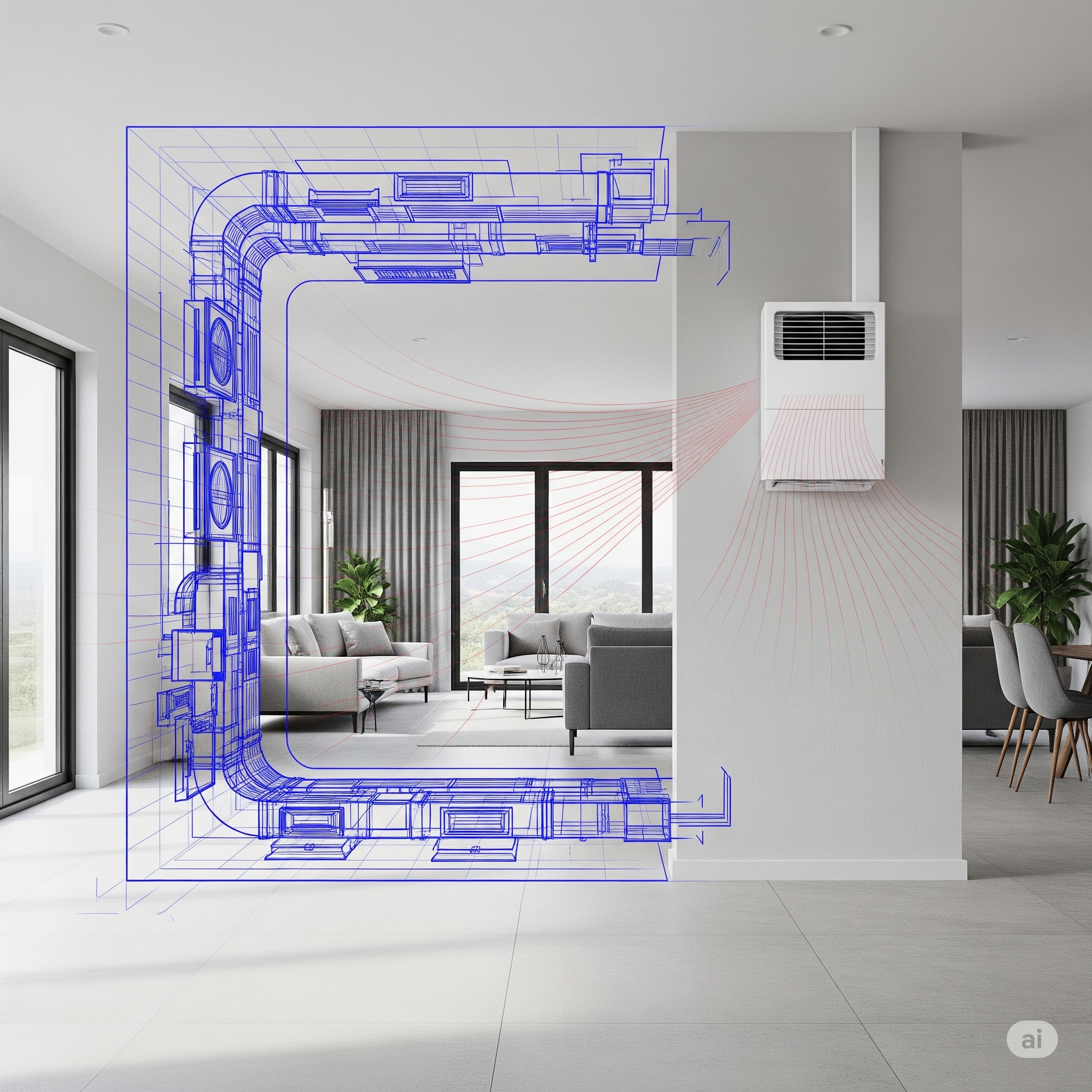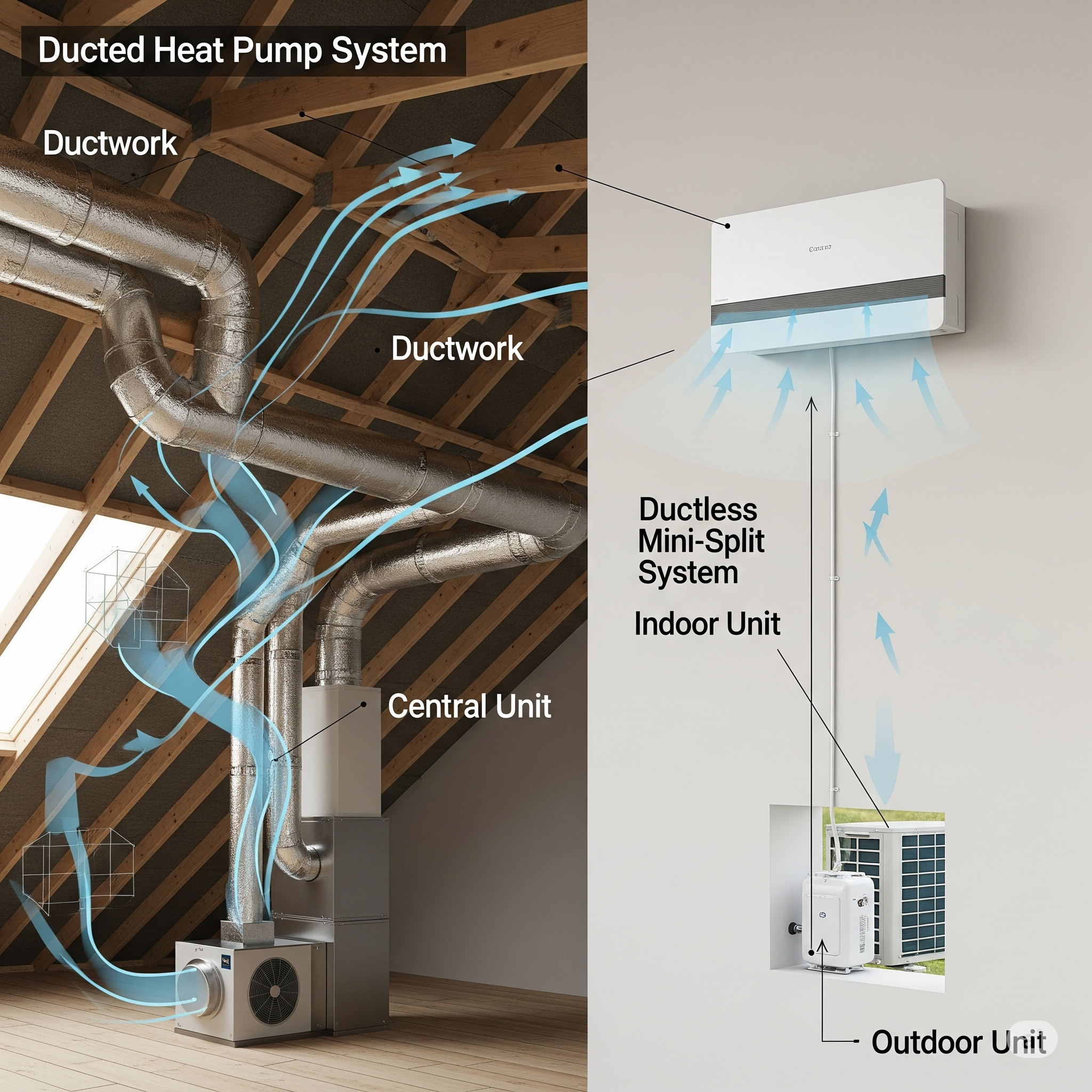Types of Heat Pump Systems Explained: Ducted & Ductless
Discover the key differences between ducted central heat pumps, ductless mini-splits, and multi-zone systems—find which type delivers the best comfort and efficiency for your Massachusetts home.

Choosing the right heat pump system for your Massachusetts home starts with understanding the three main types available: ducted central systems, ductless single-zone mini-splits, and ductless multi-zone systems. Each offers distinct advantages depending on your home's layout, existing infrastructure, and comfort preferences.
Whether you're replacing an aging oil furnace or upgrading from electric baseboard heating, understanding these system types helps you make an informed decision that balances upfront costs with long-term efficiency and comfort goals.
Ducted Central Heat Pump System
A ducted central heat pump works like a traditional central air conditioning system but provides both heating and cooling year-round. The outdoor unit connects to an indoor air handler that distributes conditioned air throughout your home via existing or newly installed ductwork. All rooms are controlled by a single thermostat, making temperature management simple and centralized.
Pros:
- Provides uniform temperature throughout the entire home
- Works with existing ductwork, reducing installation costs
- Clean interior aesthetics with no visible indoor units
- Centralized control with single thermostat
- Excellent for open-concept floor plans
Cons:
- Less energy efficient due to duct losses (10-30% heat loss)
- No room-by-room temperature control
- Expensive if new ductwork installation is required
- Heats unused spaces, wasting energy
- Requires regular duct maintenance and cleaning
Ductless Mini-Split (Single Zone)
A single-zone ductless mini-split consists of one outdoor unit connected to one indoor air handler, typically mounted on a wall or ceiling. This system heats and cools a specific room or area without requiring any ductwork. Installation involves running refrigerant lines through a small hole in the exterior wall, making it ideal for room additions, converted spaces, or targeted comfort improvements.
Pros:
- Extremely energy efficient with no duct losses
- Quick and minimal installation impact
- Perfect for heating/cooling specific rooms or additions
- Individual temperature control for the zone
- Lower upfront cost for single-room applications
Cons:
- Limited to heating/cooling one area only
- Indoor unit visible on wall or ceiling
- Requires separate system for each room needing climate control
- Not suitable for whole-home comfort needs
- May require multiple outdoor units for multiple zones
Ductless Multi-Zone System
A multi-zone ductless system connects one outdoor unit to multiple indoor air handlers throughout your home. Each indoor unit operates independently with its own remote control or smart thermostat, allowing different temperature settings in different rooms. This provides whole-home comfort with superior zone control and energy efficiency compared to ducted systems.
Pros:
- Room-by-room temperature control reduces energy waste
- Highest energy efficiency ratings available
- No duct installation required
- Heats only occupied spaces, maximizing savings
- Superior indoor air quality without ductwork contamination
Cons:
- Higher upfront equipment costs per room
- Multiple indoor units visible throughout the home
- More complex installation than single-zone systems
- Requires dedicated electrical circuits for each indoor unit
- May not provide uniform temperatures in very open floor plans
Choose Your System Wisely
The best heat pump system for your Massachusetts home depends on your existing infrastructure, budget, and comfort preferences. Ducted systems work well for homes with quality existing ductwork and open floor plans. Single-zone mini-splits excel for targeted applications like room additions or supplemental heating. Multi-zone systems offer maximum efficiency and comfort control for whole-home retrofits.
Ready to determine the best system for your home and calculate potential savings? Use our Heat Pump Cost Calculator to get personalized estimates based on your specific situation, including available Massachusetts rebates and incentives.
